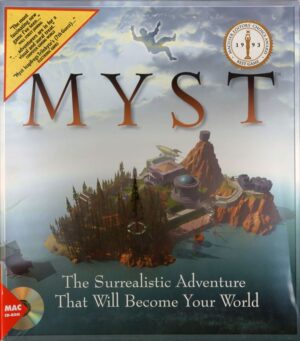Retro Replay Review
Gameplay
Atlantis: The Last Resort delivers a straightforward first-person shooting experience that hearkens back to early ‘90s classics. As the government’s most dangerous inmate, you navigate maze-like levels rendered in basic 3D, blasting through hordes of undead skeletons, corrupted guards and malfunctioning security drones. Movement and strafing feel familiar to anyone who’s played Wolfenstein 3D, though the CD-i’s limited processing power results in occasional frame rate dips and coarse collision detection.
(HEY YOU!! We hope you enjoy! We try not to run ads. So basically, this is a very expensive hobby running this site. Please consider joining us for updates, forums, and more. Network w/ us to make some cash or friends while retro gaming, and you can win some free retro games for posting. Okay, carry on 👍)
Weapon selection is minimal but serviceable: a pistol with decent range and a more powerful shotgun that chews through close-quarters threats. Ammo pickups are sparse, so you’ll need to balance aggressive play with cautious exploration. Health is replenished through med-kits scattered around each environment, encouraging backtracking and careful map-reading to uncover hidden stashes.
Between missions, Atlantis surprises with short pre-rendered 3D animations that flesh out the narrative and break up the action. Though not interactive, these cutscenes showcase higher-detail models and provide context for your mission objectives. Overall, the gameplay loop of blasting corrupted enemies, hunting resources, and advancing through dream-like resorts remains engaging despite its dated mechanics.
Graphics
On the Philips CD-i platform, Atlantis: The Last Resort pushes the hardware to its limits but still exhibits chunky textures and angular environments. Walls and floors are clad in repetitive tile patterns, and enemy sprites lack fluid animation. Nonetheless, the graphics capture the eerie ambiance of a malfunctioning dream facility, with flickering lights and looping ceiling fans that hint at a once-idyllic vacation setting gone wrong.
The low resolution is most noticeable when strafing, as walls often jitter and sprites pop in at close range. Draw distance is limited, so enemies can appear suddenly, adding tension but also causing the game to feel unfair at times. However, the pre-rendered cutscenes stand in stark contrast, featuring more detailed models and smoother camera movements that highlight what the hardware might have achieved under different circumstances.
Color palettes across levels shift to match each themed resort: tropical blues, desert sands and gothic grays. While these palettes are simple, they help each environment feel distinct. Texture bleeding can occur, but overall the graphical presentation successfully evokes the uncanny atmosphere of a virtual utopia infected by a deadly virus.
Story
Atlantis: The Last Resort sets its narrative in a future where illusory dream vacations have become the ultimate escape. When a mysterious virus corrupts the system, tourists become trapped within their own fantasies, turning serene resorts into nightmarish battlegrounds. You play the government’s most notorious criminal—a chance at redemption hinges on your ability to purge the virtual infection.
The premise is intriguing but lightly touched upon during gameplay. Most exposition arrives through the pre-rendered cutscenes, which detail how the virus spread and the government’s decision to send in a denizen of their most secure cell. In-game, communication comes via brief text prompts and mission objectives, leaving room for players to fill in narrative gaps with their own imaginations.
Despite its brevity, the story effectively justifies the level design and enemy variety. Undead skeletons guard sunken ruins in one level, while malfunctioning holographic staff roam the halls of another. The contrast between idyllic resorts and corrupted nightmares adds weight to your mission, even if the plot never delves deeply into character development or moral ambiguity.
Overall Experience
Atlantis: The Last Resort is a fascinating relic of the CD-i era. It won’t compete with contemporary PCs or consoles, but it offers a nostalgic glimpse at early first-person shooters on alternative hardware. The blend of Wolfenstein-style action, quirky story premise and occasional technical hiccups gives it a unique charm that collectors and retro enthusiasts will appreciate.
For newcomers, be prepared for dated controls, simplistic AI and a sometimes frustrating sense of trial-and-error exploration. However, the pre-rendered animations and thematic level variety help break up the formula, ensuring each mission feels a bit different. The game’s short length means you can complete it in a handful of sessions, making it a bite-sized adventure rather than a marathon.
If you’re seeking a piece of gaming history or a curiosity to show off in your CD-i collection, Atlantis: The Last Resort is worth exploring. Its rough edges and crude graphics are part of the appeal, offering a window into an ambitious but underpowered platform’s attempt at delivering an immersive shooter experience. Just don’t expect modern polish—this is retro gaming in its rawest form.
 Retro Replay Retro Replay gaming reviews, news, emulation, geek stuff and more!
Retro Replay Retro Replay gaming reviews, news, emulation, geek stuff and more!




Reviews
There are no reviews yet.